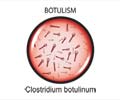
A team from Queen Mary's School of Biological and Chemical Sciences showed how they studied the molecular machine known as the 'type II bacterial secretion system', which is responsible for delivering potent toxins from bacteria such as enterotoxigenic E coli and Vibrio cholerae into an infected individual.
"Bacterial secretion systems deliver disease causing toxins into host tissue. If we can understand how these machines work, then we can work out how it they might be stopped," Professor Richard Pickersgill, who led the research, said.
In order to infect, Gram negative bacteria have to export their toxins into their host across both an inner and outer membrane.
"The pore in the outer membrane which the toxins pass through is formed from protein subunits which are guided into place by a protein pilot," Professor Pickersgill said.
"The protein pilot interacts with the subunits that form the pore in the outer membrane; if the protein pilot is missing, then the pore forms in the inner membrane and not the outer membrane and secretion is stopped.
Advertisement
The same type II secretion system that enables E coli and cholera is also used by bacteria that cause substantial food spoilage, such as Dickeya dadantii.
Advertisement
The study has been published in the journal PLoS Pathogens.
Source-ANI












